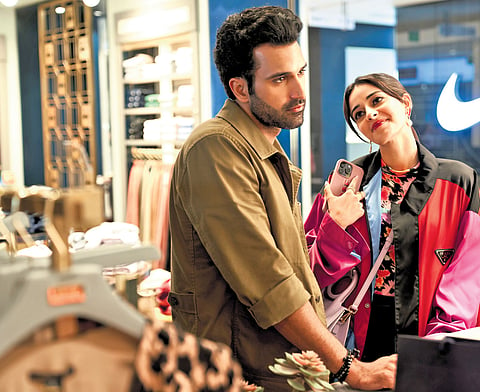‘Call Me Bae’ Web Series Review: Ananya Panday’s Debut Lacks Focus and Direction.

However, what they all seem to miss is the ability to create memorable moments that truly break down the layers of fiction and resonate with you on a deeper level.
Created by Ishita Moitra, ‘Call Me Bae’ is Prime Video’s latest addition to its collection of ‘women telling women stories,’ following other releases like Nitya Mehra’s ‘Big Girls Don’t Cry,’ Debbie Rao’s ‘Dil Dosti Dilemma,’ and Tahira Kashyap Khurrana’s ‘Sharmajee Ki Beti,’ all launched earlier this year. These narratives delve into the experiences of women in India as they seek to challenge and dismantle patriarchy with a touch of cinematic flair. There is a clear intention to highlight the daily struggles faced by women through protagonists who discover their self-worth during unexpected journeys. However, these stories often fall short in crafting memorable scenes that truly break down the layers of fiction and resonate on a deeper level. The characters, such as Asmara (Anushka Sen) from ‘Dil Dosti…’ and Kiran Sharma (Divya Dutta) from ‘Sharmajee Ki Beti,’ often come across as more like subjects burdened with various ideas. This makes their portrayals feel less authentic and more like constructs designed to convey the story’s message. Ananya Panday’s Bella Chowdhury, also known as Bae, fits this mold. Bae is introduced as a privileged young woman from a wealthy family, where her older brother receives more attention as the ‘true heir.’ Her life is largely shaped by her mother, Gayatri (Mini Mathur), who pressures her to fall in love with Agastya (Vihaan Samat) and marry him, often overlooking Bae’s own aspirations.

Fast forward two years, and she finds herself trapped in an unfulfilling marriage, feeling lost in her lavishly decorated life. The narrative moves quickly, making it hard to truly connect with her emotions during these moments. To emphasize that she isn’t as privileged as her family members, we see her in a series of uncomfortable situations where she tries to showcase her generosity. For instance, she pays the fine for a ‘poor’ man arrested by the police, even when she herself has no money left to cover her own fine. There’s also a lengthy scene where hotel concierges come to her aid, highlighting how she has helped them in the past. These attempts to evoke empathy feel rather superficial and fail to deepen her emotional journey due to the clumsy execution. The initial episodes sketch her life, detailing how it spirals after she cheats on her husband, leading to public disgrace and her family disowning her. This sets the stage for her newfound interest in journalism, sparked by a viral video where she humorously criticizes a loud TV anchor, played by Vir Das. Soon after, she receives a confessional video from an actress accusing a powerful businessman of sexual harassment. However, it’s challenging to pinpoint the show’s true focus. Is it a coming-of-age story like ‘Wake Up Sid,’ where she discovers her purpose? Or is it a whistleblower narrative where she exposes wrongdoers? Perhaps it’s intended to be a light-hearted romance or a nuanced exploration of modern relationships? As the story progresses, it becomes increasingly disjointed, and Bae’s triumphs feel less significant.

Ananya adopts a high-pitched tone as she navigates the vibrant world of Bae. At times, she embodies the innocent charm of Amelie (Audrey Tautou) from the 2001 French romantic comedy, while at other moments, she resembles the chatty Geet (Kareena Kapoor Khan) from Jab We Met (2009). However, her character doesn’t consistently engage us through her outrageous adventures. Vir Das portrays a somewhat vague character but manages to keep his performance grounded without veering into over-the-top territory. Muskkan Jaferi shines as Bae’s best friend, Saira Ali, delivering witty one-liners and entertaining expressions. Vihaan Samat, playing Bae’s husband, aims for authenticity but is limited by a nearly one-dimensional script.
Call Me Bae represents Dharmatic Entertainment’s third project with Prime Video this year, following the historical drama Ae Watan Mere Watan and the docu-series Love Storiyaan. The latter featured an episode directed by Collin D’Cunha, who makes his fiction debut with Call Me Bae. While his episode in Love Storiyaan had moments of stillness, that sense is largely absent here.
The editing has a frenetic pace that prevents us from lingering on any particular emotion. Characters move swiftly from one scene to the next, and locations change almost instantly. While this could reflect Bae’s excitement and spontaneity, it ultimately detracts from the show’s depth. Beneath its glossy surface, the series struggles with a pervasive sense of mediocrity.
Director: Collin D’Cunha
Leave a Reply